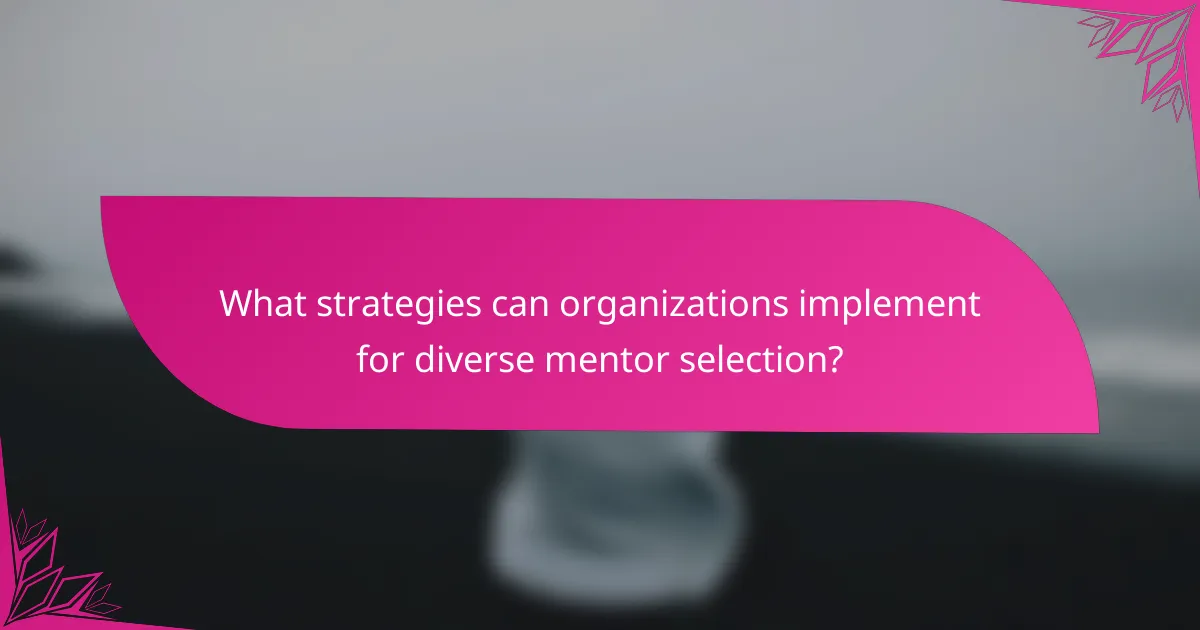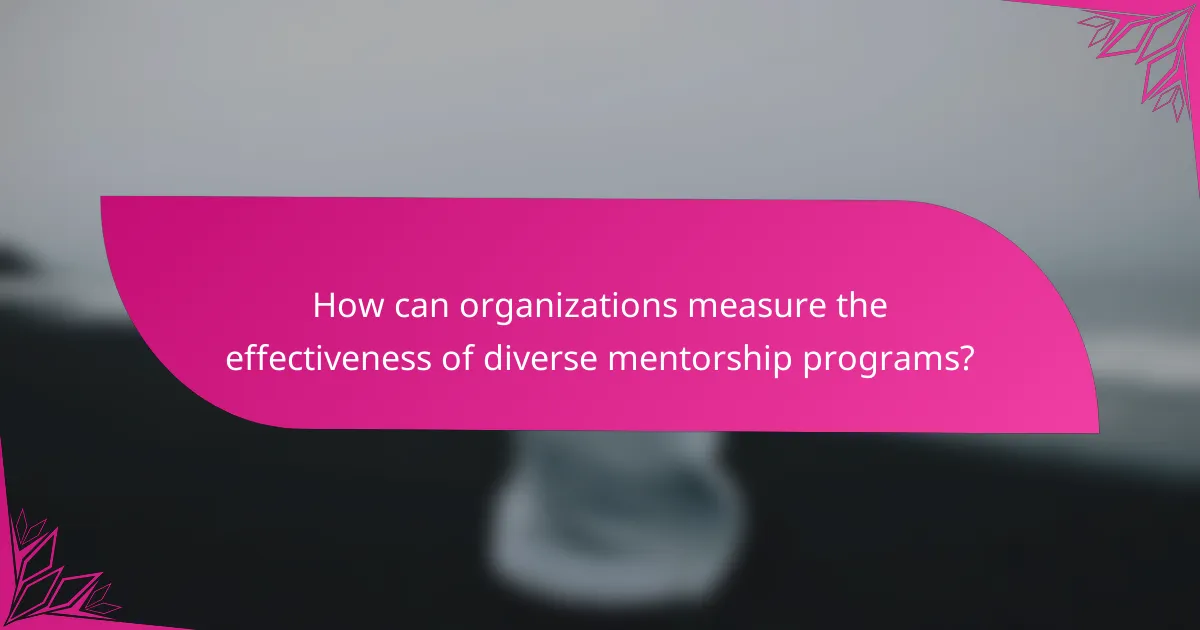Diversity in mentor selection is essential for creating a rich mentoring environment that reflects a variety of perspectives and experiences. By ensuring a diverse mentor pool, organizations can provide tailored support to mentees from different backgrounds, ultimately leading to improved satisfaction and career advancement opportunities. Implementing inclusive strategies in mentor selection not only promotes equity but also enhances the overall learning experience for all participants.

Why is diversity important in mentor selection?
Diversity in mentor selection is crucial because it brings together varied perspectives, experiences, and backgrounds, enhancing the mentoring process. A diverse mentor pool can better address the unique challenges faced by mentees from different demographics, leading to more effective guidance and support.
Enhances innovation and creativity
Diverse mentors contribute to innovation and creativity by introducing unique viewpoints and problem-solving approaches. When individuals from different backgrounds collaborate, they are more likely to generate novel ideas and solutions that might not emerge in a homogenous group.
For example, a mentor with a background in technology may offer insights that differ from those of a mentor with experience in the arts. This blend can inspire mentees to think outside the box and explore unconventional pathways in their careers.
Improves decision-making processes
Diversity in mentor selection leads to improved decision-making by incorporating a wider range of experiences and insights. This variety helps to challenge assumptions and biases, resulting in more informed and balanced choices.
Organizations that prioritize diverse mentorship often see better outcomes, as decisions are scrutinized from multiple angles. For instance, a diverse mentor team can provide feedback that considers cultural nuances, which is essential in today’s globalized work environment.
Fosters inclusive environments
Selecting diverse mentors fosters inclusive environments where all individuals feel valued and understood. When mentees see mentors who reflect their identities, it enhances their sense of belonging and encourages them to engage more fully in the mentoring process.
To create an inclusive mentoring program, organizations should actively seek mentors from various backgrounds, ensuring representation across gender, ethnicity, and socioeconomic status. This approach not only benefits the mentees but also enriches the organization’s culture as a whole.

How does diversity impact mentorship outcomes?
Diversity significantly enhances mentorship outcomes by fostering a more inclusive environment that caters to a wider range of experiences and perspectives. This leads to improved satisfaction among mentees and greater opportunities for career advancement.
Increases mentee satisfaction
Diverse mentorship relationships often lead to higher levels of mentee satisfaction. When mentees see themselves represented in their mentors, they feel more understood and valued, which can enhance their overall experience.
Mentors from varied backgrounds can relate to different challenges faced by mentees, providing tailored guidance and support. This connection fosters trust and encourages open communication, which is essential for effective mentorship.
Boosts career advancement opportunities
Diversity in mentorship can significantly boost career advancement opportunities for mentees. Mentors with diverse backgrounds often have access to different networks and resources, which can open doors for their mentees.
For instance, a mentee paired with a mentor from a different industry or cultural background may gain insights and connections that would otherwise be unavailable. This can lead to unique job opportunities and career paths that are more inclusive and representative of various demographics.
Promotes diverse perspectives in problem-solving
Diverse mentorship encourages a variety of perspectives in problem-solving, which can lead to more innovative solutions. When mentors and mentees come from different backgrounds, they bring unique viewpoints that can challenge conventional thinking.
Incorporating diverse perspectives can enhance creativity and lead to better decision-making. For example, a team with a mix of experiences may approach a project from multiple angles, ultimately resulting in a more comprehensive and effective strategy.

What strategies can organizations implement for diverse mentor selection?
Organizations can enhance diversity in mentor selection by adopting targeted strategies that prioritize inclusivity and representation. Implementing these strategies not only fosters a more equitable mentoring environment but also enriches the learning experience for mentees.
Establish inclusive recruitment practices
Inclusive recruitment practices are essential for attracting a diverse pool of mentors. Organizations should actively seek candidates from various backgrounds, including different genders, ethnicities, and professional experiences. This can be achieved through outreach to diverse networks and partnerships with organizations that focus on underrepresented groups.
Additionally, using unbiased language in job descriptions and ensuring diverse hiring panels can help eliminate systemic barriers. Regularly reviewing recruitment processes for inclusivity can further enhance the effectiveness of these practices.
Utilize mentorship matching software
Mentorship matching software can streamline the process of pairing mentors and mentees based on shared interests and backgrounds. These tools often include algorithms that consider various factors such as professional goals, personal experiences, and cultural backgrounds, ensuring a more tailored match.
When selecting software, organizations should look for features that allow customization to reflect their diversity goals. Regularly updating the matching criteria based on feedback can also improve the effectiveness of the program.
Provide diversity training for mentors
Diversity training equips mentors with the skills to understand and address the unique challenges faced by mentees from different backgrounds. This training should cover topics such as cultural competency, unconscious bias, and effective communication strategies.
Organizations should consider ongoing training sessions rather than a one-time workshop to reinforce these concepts. Encouraging mentors to share their experiences and challenges can also foster a supportive learning environment that values diversity.

What criteria should be considered in mentor selection?
When selecting a mentor, it’s essential to consider criteria that align with the mentee’s goals and needs. Key factors include the mentor’s professional background, demographic diversity, and their availability and commitment to the mentoring relationship.
Professional background and expertise
The mentor’s professional background and expertise are crucial for effective guidance. Look for mentors who have relevant experience in the mentee’s field or industry, as this can provide valuable insights and practical advice. For example, a mentor with a decade of experience in technology can offer guidance on navigating career paths in that sector.
Additionally, consider the mentor’s achievements and skills. A mentor who has successfully led projects or teams can impart lessons learned and strategies for overcoming challenges. This expertise can be particularly beneficial in helping mentees develop specific competencies.
Demographic diversity
Demographic diversity in mentor selection can enhance the mentoring experience by providing varied perspectives and insights. Mentors from different backgrounds can introduce mentees to new ideas and approaches, fostering creativity and innovation. For instance, a mentor from a different cultural background may offer unique strategies for problem-solving.
Moreover, diverse mentors can serve as role models for underrepresented groups, helping to break down barriers and promote inclusivity. This representation can inspire mentees to pursue their goals with confidence, knowing they have support from someone who understands their challenges.
Mentor availability and commitment
Availability and commitment are vital for a successful mentoring relationship. A mentor should have the time and willingness to engage regularly with the mentee, whether through scheduled meetings or informal check-ins. It’s important to clarify expectations regarding the frequency and format of interactions upfront.
Assessing a mentor’s commitment can involve discussing their previous mentoring experiences and understanding how they prioritize mentoring in their schedule. A mentor who is genuinely invested in the mentee’s growth will be more likely to provide meaningful support and guidance throughout the relationship.

How can organizations measure the effectiveness of diverse mentorship programs?
Organizations can measure the effectiveness of diverse mentorship programs by evaluating mentee progress, gathering feedback on mentor-mentee relationships, and analyzing retention rates of diverse talent. These metrics provide insights into the program’s impact and areas for improvement.
Track mentee progress and outcomes
To effectively track mentee progress, organizations should establish clear goals and benchmarks at the outset of the mentorship program. Regular check-ins can help assess whether mentees are meeting these objectives, which may include skill development, career advancement, or increased confidence.
Utilizing performance metrics such as promotions, project completions, or skill assessments can provide quantifiable data on mentee outcomes. This data can be compared against non-mentored peers to gauge the program’s overall effectiveness.
Conduct surveys on mentor-mentee relationships
Surveys are a valuable tool for assessing the quality of mentor-mentee relationships. Organizations should design surveys that focus on communication, support, and overall satisfaction with the mentorship experience. Questions can range from rating the mentor’s availability to the perceived value of the guidance received.
Collecting feedback at multiple points during the mentorship can help identify trends and areas for improvement. Anonymity can encourage honest responses, leading to more accurate insights into the program’s strengths and weaknesses.
Analyze retention rates of diverse talent
Retention rates of diverse talent can serve as a critical indicator of the mentorship program’s success. Organizations should track how many mentees remain with the company over time compared to their peers. A higher retention rate among mentored individuals may suggest that the program is effectively supporting diverse employees.
Additionally, comparing retention rates before and after implementing a mentorship program can highlight its impact. Organizations should aim for continuous improvement by analyzing exit interviews and feedback from departing employees to understand their experiences related to mentorship.

What are the challenges of implementing diversity in mentor selection?
Implementing diversity in mentor selection faces several challenges, primarily stemming from unconscious biases and structural barriers within organizations. These challenges can hinder the effectiveness of mentorship programs and limit opportunities for underrepresented groups.
Unconscious bias in selection processes
Unconscious bias significantly affects mentor selection, often leading to favoritism towards individuals who share similar backgrounds or experiences. This can result in a lack of diversity among mentors, perpetuating existing inequalities within organizations.
To mitigate unconscious bias, organizations should implement structured selection processes that emphasize objective criteria over subjective judgments. Techniques such as blind recruitment and diverse selection panels can help reduce the impact of personal biases.
Regular training on recognizing and addressing unconscious bias is crucial. Workshops and seminars can equip decision-makers with the tools to make more equitable choices, ultimately fostering a more inclusive mentoring environment.

